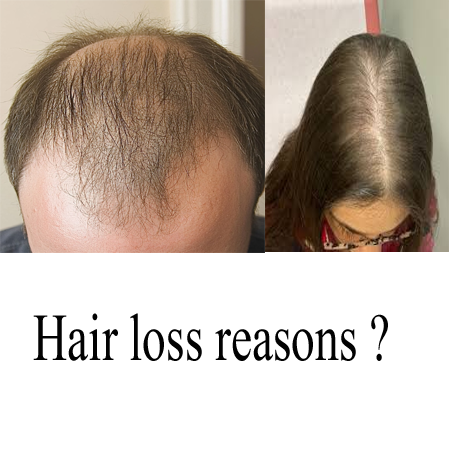Hair loss causes and treatments
Hair loss or hair fall, also known as alopecia, can be caused by various factors, including genetics, hormonal changes, medical conditions, and certain medicati
The main hormone responsible for hair loss is dihydrotestosterone (DHT), a derivative of testosterone that causes hair follicles to shrink, leading to thinner, shorter hair and eventual hair loss in both men and women with a genetic predisposition to androgenetic alopecia. Other hormones like thyroid hormones and estrogen also play a role; imbalanced thyroid hormones can cause hair loss, while declining estrogen levels during menopause can give androgens more power, contributing to hair loss.

Common Hair Loss Treatments
- Minoxidil (Rogaine):
-
This process is medication available in foam and liquid forms. Its the most widely used treatment for pattern baldness in both men and women.
- Finasteride (Propecia):
A prescription oral medication, finasteride is approved for men with male-pattern baldness. It works by inhibiting the production of a hormone called dihydrotestosterone (DHT).
- Platelet-Rich Plasma (PRP) Therapy:
This procedure involves drawing a patients own blood, processing it to concentrate the platelets and growth factors, and then injecting the plasma into the scalp. PRP therapy is believed to stimulate hair follicles and promote new hair growth.
- Laser Therapy:
Low-level laser therapy (LLLT) devices, such as combs, caps, and helmets, are approved to treat hereditary hair loss in men and women.
- Hair Transplant Surgery:
Hair transplant surgery is permanent solution for hair fall or hair loss, there are two type of hair transplant method (i). Follicular Unit Extraction (FUE) and (ii). Follicular Unit Transplantation (FUT), FUT hair transplant is best method for hair transplant.
hair loss reasons
The most common cause, this is a genetic condition that results in gradual hair thinning or receding hairlines. Hair loss reasons may be Hormonal Changes, Medical Conditions, Lifestyle & Environment, Stress etc.
Hair loss treatment for women
Here are several potential treatments for female hair loss:
Nutritional support :- Deficiencies in nutrients like iron, zinc, and Vitamin D can contribute to hair loss. Your doctor may recommend supplements if blood tests reveal a deficiency. A balanced diet rich in protein, fruits, and vegetables can also support hair health.
Essential oils:- Some essential oils, such as rosemary oil, have been shown to have a similar effect to minoxidil in treating androgenetic alopecia, although more research is needed.
Stress management:- High-stress levels can contribute to hair loss. Practices such as meditation, yoga, and exercise can help manage stress.
Gentle hair care:- Avoiding tight hairstyles, limiting heat styling, and using gentle, sulfate-free shampoos can prevent further hair damage.
best shampoo for hair fall
Best shampoo for hair fall control is LOréal Professionnel Absolut Repair Shampoo For Dry and Damaged Hair With Protein & Omega-9, Nykaa Naturals Anti-Dandruff Sulphate-Free Shampoo With Apple Cider Vinegar, Ginger & Tea Tree Oil.
Tag:
hair loss, which vitamin deficiency causes hair loss, hair loss treatment, hair loss reasons, minoxidil for hair loss, best hair loss treatment for female, how to stop hair fall, hair fall control, ha
About Author:
 Dr. Majnu
Dr. Majnu
2025-09-04 14:18:27
Skin Care and Hair Specialist

![]() Dr. Majnu
Dr. Majnu